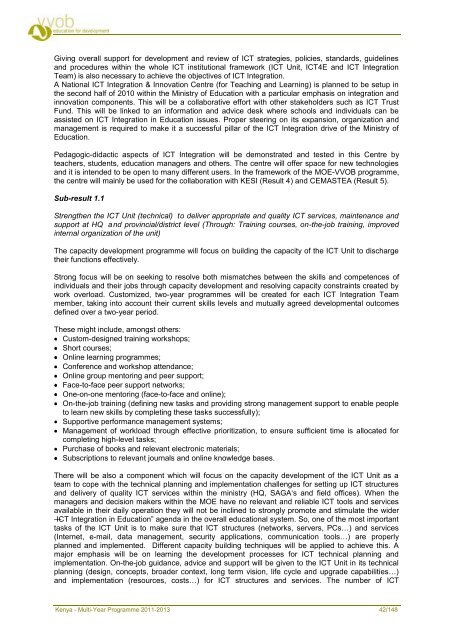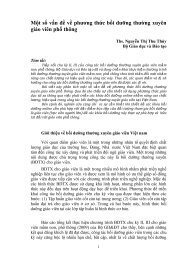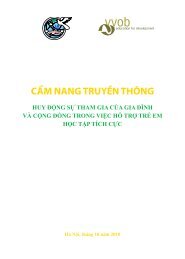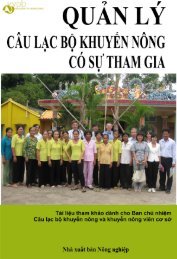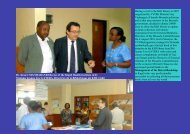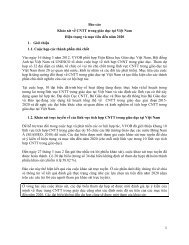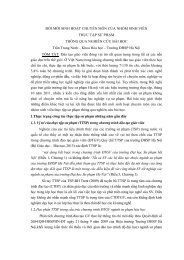Kenya Multi-Year Programme 2011-2013 - VVOB
Kenya Multi-Year Programme 2011-2013 - VVOB
Kenya Multi-Year Programme 2011-2013 - VVOB
- No tags were found...
You also want an ePaper? Increase the reach of your titles
YUMPU automatically turns print PDFs into web optimized ePapers that Google loves.
Giving overall support for development and review of ICT strategies, policies, standards, guidelinesand procedures within the whole ICT institutional framework (ICT Unit, ICT4E and ICT IntegrationTeam) is also necessary to achieve the objectives of ICT Integration.A National ICT Integration & Innovation Centre (for Teaching and Learning) is planned to be setup inthe second half of 2010 within the Ministry of Education with a particular emphasis on integration andinnovation components. This will be a collaborative effort with other stakeholders such as ICT TrustFund. This will be linked to an information and advice desk where schools and individuals can beassisted on ICT Integration in Education issues. Proper steering on its expansion, organization andmanagement is required to make it a successful pillar of the ICT Integration drive of the Ministry ofEducation.Pedagogic-didactic aspects of ICT Integration will be demonstrated and tested in this Centre byteachers, students, education managers and others. The centre will offer space for new technologiesand it is intended to be open to many different users. In the framework of the MOE-<strong>VVOB</strong> programme,the centre will mainly be used for the collaboration with KESI (Result 4) and CEMASTEA (Result 5).Sub-result 1.1Strengthen the ICT Unit (technical) to deliver appropriate and quality ICT services, maintenance andsupport at HQ and provincial/district level (Through: Training courses, on-the-job training, improvedinternal organization of the unit)The capacity development programme will focus on building the capacity of the ICT Unit to dischargetheir functions effectively.Strong focus will be on seeking to resolve both mismatches between the skills and competences ofindividuals and their jobs through capacity development and resolving capacity constraints created bywork overload. Customized, two-year programmes will be created for each ICT Integration Teammember, taking into account their current skills levels and mutually agreed developmental outcomesdefined over a two-year period.These might include, amongst others:Custom-designed training workshops;Short courses;Online learning programmes;Conference and workshop attendance;Online group mentoring and peer support;Face-to-face peer support networks;One-on-one mentoring (face-to-face and online);On-the-job training (defining new tasks and providing strong management support to enable peopleto learn new skills by completing these tasks successfully);Supportive performance management systems;Management of workload through effective prioritization, to ensure sufficient time is allocated forcompleting high-level tasks;Purchase of books and relevant electronic materials;Subscriptions to relevant journals and online knowledge bases.There will be also a component which will focus on the capacity development of the ICT Unit as ateam to cope with the technical planning and implementation challenges for setting up ICT structuresand delivery of quality ICT services within the ministry (HQ, SAGA‘s and field offices). When themanagers and decision makers within the MOE have no relevant and reliable ICT tools and servicesavailable in their daily operation they will not be inclined to strongly promote and stimulate the wider―ICT Integration in Education‖ agenda in the overall educational system. So, one of the most importanttasks of the ICT Unit is to make sure that ICT structures (networks, servers, PCs…) and services(Internet, e-mail, data management, security applications, communication tools…) are properlyplanned and implemented. Different capacity building techniques will be applied to achieve this. Amajor emphasis will be on learning the development processes for ICT technical planning andimplementation. On-the-job guidance, advice and support will be given to the ICT Unit in its technicalplanning (design, concepts, broader context, long term vision, life cycle and upgrade capabilities…)and implementation (resources, costs…) for ICT structures and services. The number of ICT<strong>Kenya</strong> - <strong>Multi</strong>-<strong>Year</strong> <strong>Programme</strong> <strong>2011</strong>-<strong>2013</strong> 42/148


